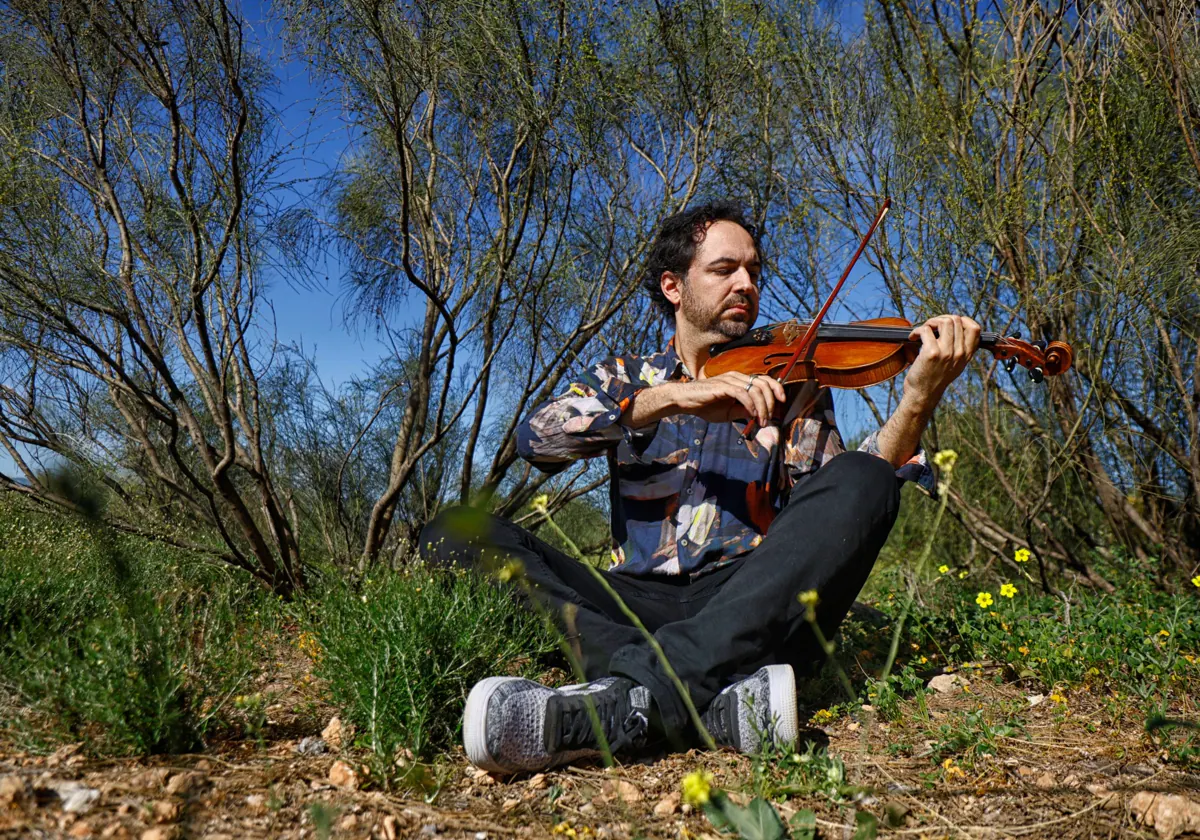Violinist Jesús Reina presents his most personal concert yet: 'I feel vulnerable because I'm showing who I really am'
The Malaga-born musician is stepping on stage at the city's Cervantes theatre this Tuesday to showcase his world of sound, from 'verdial' (Malaga folk music) to Bach, from Paganini to Paco de Lucía
There are extraordinary coincidences. Matters of destiny. This Tuesday (30 April), violinist Jesús Reina is giving his most personal concert yet at the Cervantes Theatre in Malaga, where he will present his unique musical revolution: for the first time, he dares to showcase his world of sound, which knows no labels - a universe where 'verdial' (an ancient folk music and dance tradition from Malaga province), Bach, the Beatles and Paco de Lucía peacefully coexist. But since his favourite violins have been in the workshop in recent weeks, one of his students lent him his own to rehearse with, which he had found by looking through old instruments.
"It turned out to belong to my first music teacher after my grandfather, Vincenzo Puma, the person who taught me to improvise and read music," Reina says. It was with that violin that he prepared the concert that brings him back to his roots, where, of course, a melody of Puma's will be played.
"I feel much more vulnerable because I'm showing who I really am in every aspect, through music," says the violinist about his concert Cruze de Caminos (Crossroads, on Tuesday 30 April, 8pm. 24 euros). Yes, a 'z' in 'Cruze' instead of the correct spelling 'Cruce'. And he explains this: "The z and c sound the same in this case but are written differently. Just like how genres of music dress in different outfits but are the same in essence."
Cruze de Caminos concert details
-
Date Tuesday 30 April.
-
Time 8pm
-
Venue Cervantes Theatre, Malaga.
-
Ticket price 24 euros
-
More information www.teatrocervantes.com/
For him it is not just a recital, but "a new way of being in music". Reina wants to bring to the stage what happens naturally in his life. The vast majority know him for his international career as a classical soloist, a career he began as a child and to which he has already dedicated over 30 years. He is now 37. "But maybe after a concert, in the restaurant, we'll improvise and have a jam session. And at a family gathering, I'll take out my violin and play some 'verdiales' or I'll do a rumba with my uncle," he says.
For the first time, Reina will showcase his own compositions that draw on his influences
All that is not seen is part of him - this is how he wants to present himself to the public. At the Cervantes Theatre he will play everything from 'verdiales', with which he learned to play the violin next to his grandfather, founder of the band San José del Viso, to complex works by Paganini. He will improvise to show how musical genres that are apparently distant, share more than what we initially think. From a "verdial", for example, he can connect with country music, to then follow with a classical melody.
He will, moreover, make his debut as a composer. For the first time, Reina dares to perform his own compositions, free from the conventions that classical music often entails. He now feels capable of creating a piece with an Arabic-sounding scale, only to switch two seconds later to something reminiscent of Bach. "And that's absolutely fine, because it's all part of my world of sound. He also reveals that another one of his compositions will pay tribute to Paco de Lucía, Bach and 'verdiales', with an aesthetic style reminiscent of composer Eugène Ysaÿe.
Reina is not shy to admit that his world - the classical world - has a lot to learn from pop, understood as popular music. He explains that each pop artist gives their composition their own personal touch, makes it their own and manages to get the audience to instantly identify them when it is played. "It's one of the few genres that has kept the soul alive, because the soul, in what we call classical music, was in hibernation," he says. The great works of the canon, however, seem to be "museum pieces", untouchable, "instead of leaving your mark on them and letting the music affect you and you affect the music". He points out that this has always been his aim, "to be part of his piece and not simply an external element that reproduces it".
"Emotion has been downplayed in the world I come from, and it's a basic thing"
His wish for this Tuesday is simply to move the audience. "This aspect has been downplayed in the world I come from, which I think is the most important. A hug never goes out of fashion. I want music to be an embrace, a caress," he says. And for that, he breaks with the prejudices of what is wrongly called cultured music. "These are elements that everyone understands. Someone has had the great ability to create a piece of artistic and creative magnitude, but it is made up of elements that belong to us all, that are perfectly understandable, that speak of tragedy, humour... You don't need to have any knowledge of sonata form to be moved by it."
In this sense, he acknowledges that his experience as a judge on Tierra de Talento, the Canal Sur talent show that rewards artistic excellence in singing, instruments and dance, has influenced him. "There I played many things I had never played before: rock and pop music, collaborations with flamenco artists... And, somehow, when people see me in the street they tell me that they have connected with the music through the violin, thanks to those moments I have shared on stage with José Mercé or with India Martínez."
A child prodigy on the violin, Reina is used to being the youngest. At 37, he performs on the world's main stages; has his own festival (Málaga Clásica, with his wife Anna Margrethe Nilsen); his own school (Galamian International Academy); and, appears on television. But the violinist who can do anything values imperfection - hence the dissonant 'z' in his concert title - because "true art must be willing to be flawed". "We are flawed," he states. And he continues to play with music as if he were a child: "I matured very quickly, but in other ways I'm looking for the child I couldn't be at times." In case he forgets, his three-year-old Lucas will be there to remind him.

